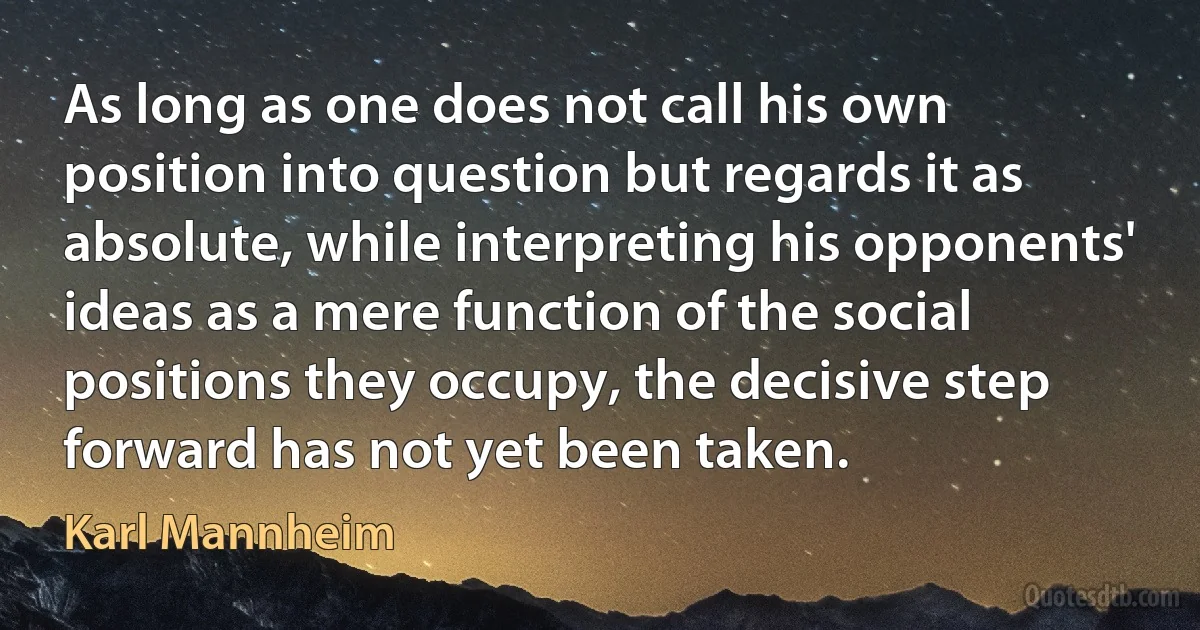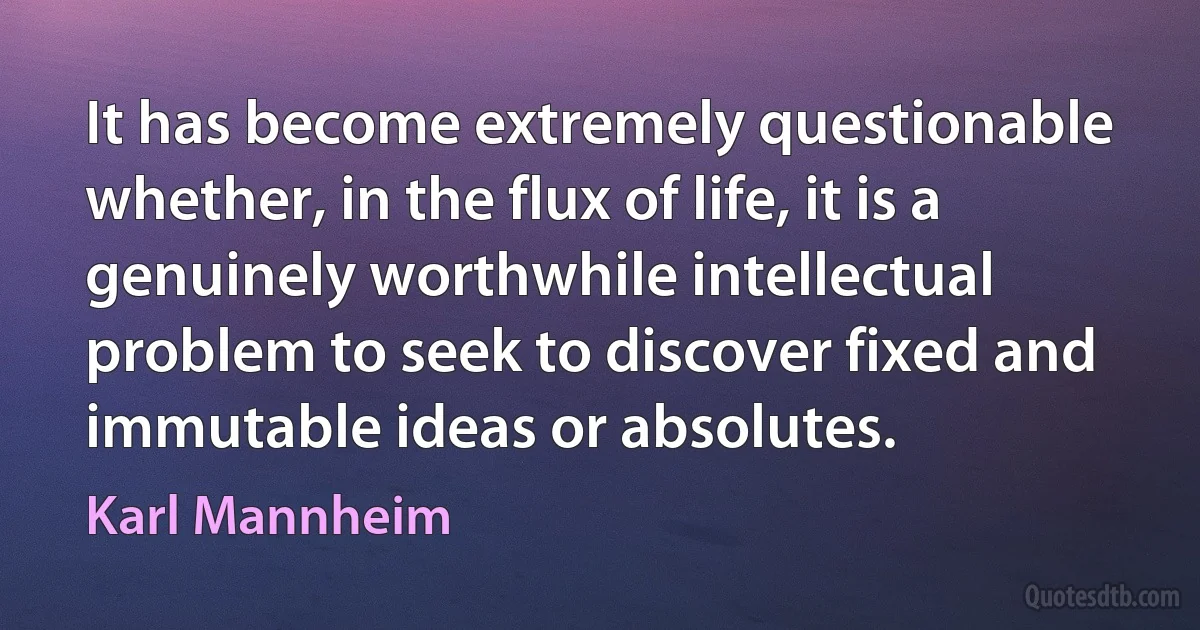Karl Mannheim quotes
Karl Mannheim was a Hungarian-born sociologist, recognized as one of the founding figures of the sociology of knowledge. His work explored how social context influences thought and ideology. He significantly shaped critical social theory and left a lasting impact on the study of ideas in society. Here are 30 of his quotes:
At this point in history when all things which concern man and the structure and elements of history itself are suddenly revealed to us in a new light, it behooves us in our scientific thinking to become masters of the situation, for it is not inconceivable that sooner than we suspect, as has often been the case before in history, this vision may disappear, the opportunity may be lost, and the world will once again present a static, uniform, and inflexible countenance.

Karl Mannheim
Whereas the particular conception of ideology designates only a part of the opponent's assertions as ideologies - and this only with reference to their content, the total conception calls into question the opponent's total Weltanschauung (including his conceptual apparatus), and attempts to understand these concepts as an outgrowth of the collective life of which he partakes.

Karl Mannheim
In attempting to expose the views of another, one is forced to make one's own view appear infallible and absolute, which is a procedure altogether to be avoided if one is making a specifically non-evaluative investigation. The second possible approach is nevertheless to combine such a non-evaluative analysis with a definite epistemology. Viewed from the angle of this second approach there are two separate and distinct solutions to the problem of what constitutes reliable knowledge - the one solution may be termed relationism, and the other relativism.

Karl Mannheim
Conflicting intellectual positions may actually come to supplement one another.
It is imperative in the present transitional period to make use of the intellectual twilight which dominates our epoch and in which all values and points of view appear in their genuine relativity. We must realize once and for all that the meanings which make up our world are simply an historically determined and continuously developing structure in which man develops, and are in no sense absolute.

Karl Mannheim
A modern theory of knowledge which takes account of the relational as distinct from the merely relative character of all historical knowledge must start with the assumption that there are spheres of thought in which it is impossible to conceive of absolute truth existing independently of the values and position of the subject and unrelated to the social context.

Karl Mannheim
In our contemporary social and intellectual plight, it is nothing less than shocking to discover that those persons who claim to have discovered an absolute are usually the same people who also pretend to be superior to the rest. To find people in our day attempting to pass off to the world and recommending to others some nostrum of the absolute which they claim to have discovered is merely a sign of the loss of and the need for intellectual and moral certainty, felt by broad sections of the population who are unable to look life in the face.

Karl Mannheim
To-day, there are too many points of view of equal value and prestige, each showing the relativity of the other, to permit us to take any one position and to regard it as impregnable and absolute. Only this socially disorganized intellectual situation makes possible the insight, hidden until now by a generally stable social structure and the practicability of certain traditional norms, that every point of view is particular to a social situation.

Karl Mannheim
It may possibly be true that, to continue to live on and to act in a world like ours, it is vitally necessary to seek a way out of this uncertainty of multiple alternatives; and accordingly people may be led to embrace some immediate goal as if it were absolute, by which they hope to make their problems appear concrete and real. But it is not primarily the man of action who seeks the absolute and immutable, but rather it is he who wishes to induce others to hold on to the status quo because he feels comfortable and smug under conditions as they are.

Karl Mannheim
The particular conception of ideology operates primarily with a psychology of interests, while the total conception uses a more formal functional analysis, without any reference to motivations, confining itself to an objective description of the structural differences in minds operating in different social settings. The former assumes that this or that interest is the cause of a given lie or deception. The latter presupposes simply that there is a correspondence between a given social situation and a given perspective, point of view, or apperception mass. In this case, while an analysis of constellations of interests may often be necessary it is not to establish causal connections but to characterize the total situation. Thus interest psychology tends to be displaced by an analysis of the correspondence between the situation to be known and the forms of knowledge.

Karl Mannheim
The general form of the total conception of ideology is being used by the analyst when he has the courage to subject not just the adversary's point of view but all points of view, including his own, to the ideological analysis.
At the present stage of our understanding it is hardly possible to avoid this general formulation of the total conception of ideology, according to which the thought of all parties in all epochs is of an ideological character.

Karl Mannheim
Relativism is a product of the modern historical-sociological procedure which is based on the recognition that all historical thinking is bound up with the concrete position in life of the thinker [Standortsgebundenheit des Denkers]. But relativism combines this historical-sociological insight with an older theory of knowledge which was as yet unaware of the interplay between conditions of existence and modes of thought, and which modelled its knowledge after static prototypes such as might be exemplified by the proposition 2 x 2 = 4. This older type of thought, which regarded such examples as the model of all thought, was necessarily led to the rejection of all those forms of knowledge which were dependent upon the subjective standpoint and the social situation of the knower, and which were, hence, merely "relative."

Karl Mannheim
When we attribute to one historical epoch one intellectual world and to ourselves another one, or if a certain historically determined social stratum thinks in categories other than our own, we refer not to the isolated cases of thought-content, but to fundamentally divergent thought-systems and to widely differing modes of experience and interpretation.

Karl Mannheim
The norms arising out of such actual life situations do not exist in a social vacuum, but are effective as real sanctions for conduct. Relationism signifies merely that all of the elements of meaning in a given situation have reference to one another and derive their significance from this reciprocal interrelationship in a given frame of thought. Such a system of meanings is possible and valid only in a given type of historical existence, to which, for a time, it furnishes appropriate expression.

Karl Mannheim
The non-evaluative general total conception of ideology is to be found primarily in those historical investigations, where, provisionally and for the sake of the simplification of the problem, no judgments are pronounced as to the correctness of the ideas to be treated. This approach confines itself to discovering the relations between certain mental structures and the life-situations in which they exist.

Karl Mannheim
Karl Mannheim
Occupation: German PhilosopherBorn: March 27, 1893
Died: January 9, 1947
Quotes count: 30
Wikipedia: Karl Mannheim











